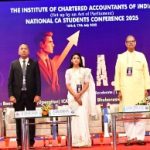Bhubaneswar: The 2nd edition of 2-day South Asia Communication Conference (SACC) on the theme “Journalism Education in South Asia: Is there any paradigm shift in over 100 years?” held at School of Mass Communication, KIIT Deemed to be University , was concluded here on Friday.
Guests of the conference were Prof. Biswajit Das, the founding Director of Centre for Culture, Media & Governance of Jamia Millia Islamia, New Delhi; Prof. Jnyana Ranjan Mohanty, Registrar, KIIT Deemed to be University and Prof. Himansu Sekhar Khatua, CEO, School of Mass Communication, Film and Media Sciences & Fashion Technology, KIIT DU.
Prof. Khatua delivered welcome address and gave a brief note on the chronological growth of the School of Mass Communication along with the achievement and success of KIIT Deemed to be University. He emphasized the need for a change of syllabus and curriculum, writing research papers, the requirement of communication experts to help young journalists in their training and so on. Dr. Bidu Bhusan Dash, the Course Coordinator of the School of Mass Communication and Convenor of SACC, introduced the theme of the conference.
In his speech, Prof. J R Mohanty, told the success story of KIIT Deemed to be University. He narrated the global achievements and accreditations the University has earned within a very short span of time due to the tireless efforts and vision of Hon’ble Founder of KIIT and KISS Dr. Achyuta Samanta. He congratulated the School of Mass Communication for organising such a conference and welcomed all the delegates to this conference.
The chief guest of the inaugural session Prof. Das in his speech stressed the importance on the changing trend of Journalism. Journalism education should be synchronized with the culture and social aspects of every region and society. Western culture should not be the idle format and objective of journalism education.
Abstract book of this conference which consists of 24 research papers from various participants from Bangladesh, Nepal, Sri Lanka and India was unveiled. The vote of thanks was proposed by Ruby Nanda, Assistant Professor of School of Mass Communication.






